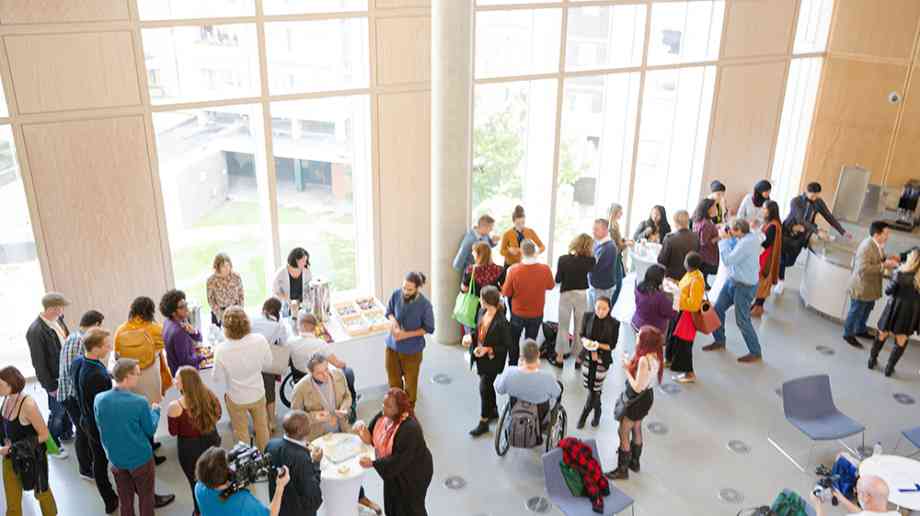Sue Robb of 4Children talks to Julie Laughton and Alison Britton from the Department for Education about the role of childminders in delivering the 30 hours free entitlement.

Organising an accessible event
Before you begin, it is important to understand accessibility and why it might be needed. It is important that all attendees, including those with disabilities have equal access to the event, including physical spaces, information and communication
It is important to recognise that disabilities vary and can include mobility, sensory, cognitive and communication impairments. For an event to be accessible, you need to address these needs.
Planning
The best place to begin is with planning and it is important to do this early. For the best possible results, work with experts and organisations that specialise in accessibility for guidance. Identify any potential barriers that may hinder access for attendees with disabilities, including the venue, transport options, and communication methods.
Registration options should be accessible – this could be online registration forms that are screen reader-friendly or alternative methods for attendees who may have difficulty with traditional forms. Provide pre-event and in-person assistance for attendees who need help with registration, wayfinding, or other aspects of the event.
You can also invest in accessible event technology, such as event apps and websites that are designed to be user-friendly for individuals with disabilities. Ensure that the apps and websites are properly updated, so attendees can easily access event information, schedules and any other updates.
Make sure your event programme features diverse and inclusive content. Include speakers, performers, and presenters with disabilities and encourage speakers to use accessible presentation formats and provide materials in advance.
Staff awareness
Staff training on accessibility is also incredibly important. Event staff and volunteers should be trained on disability awareness and how to assist attendees with disabilities respectfully. Encourage a culture of inclusivity at your organisation and educate staff about available accessibility resources and services.
Venue
The venue is the most important thing to consider. Ensure that the location you book has wheelchair ramps, lifts, accessible toilets and parking for people with disabilities. Also make sure that the venue is easily accessible for wheelchair users – for example that the doors and walkways are wide enough and there is space for wheelchairs in conference halls and meeting rooms.
Allocate spaces for attendees with disabilities near accessible entrances and exits, when planning seating arrangements. Ensure that the seating provided is flexible to accommodate wheelchairs and other mobility aids.
When picking a venue, make sure that accessible transport options are available. This could be by arranging accessible transportation services or ensuring proximity to accessible public transport. Make sure that attendees are aware of this information.
Communication
Information before and during the event should be accessible. Event materials, including brochures, flyers and websites should be provided in multiple formats, including digital, printed, large print and braille. Use plain language and make sure that digital content is compatible with screen readers and other assistive technologies.
Also make sure you have the ability to provide assistive technology, like hearing loops or sign language interpreters, to facilitate communication for attendees with hearing impairments. Make sure that presentations and speeches are transcribed or captioned in real-time and available after the event is over.
Wayfinding
In order for attendees to navigate the event, clear signage is a must. Use large, easy-to-read fonts and high-contrast colours. You can also use tactile signage for individuals with visual impairments. There should be clear directions to accessible facilities and services.
Emergency planning
When planning for emergencies and evacuations, always keep accessibility in mind. Make sure that accessible evacuation routes are available and that staff are trained in how to assist attendees with disabilities should an emergency occur.
Feedback and evaluation
After the event, ask for feedback from attendees to assess the accessibility of your event. Again make sure that your feedback form is accessible. You can then use this feedback to make improvements for your next events and demonstrate your commitment to accessibility.
In conclusion, organising an accessible event requires planning and a commitment to inclusivity. It is important to consider the diverse needs of all attendees, and then create an event that not only complies with legal requirements but also creates a welcoming and inclusive atmosphere. There are several things to consider when planning an event to be accessible, including the venue, communication and information, wayfinding and emergency planning. Accessible events benefit everyone, by promoting diversity, equity, and an inclusive atmosphere. Remember that accessibility is an ongoing process, and you will learn more each time you host an event.
Company Focus
Located in Bromley, Japanese Knotweed Eradication Ltd has been providing solutions in the treatment and removal of Japanese Knotweed (Fallopia Japonica) for over a decade. During this time we have mastered a repertoire of methods, from herbicidal treatments to landscaping solutions, tailored to address the unique challenges our clients face with this pervasive weed.
Event Diary
UKREiiF has quickly become a must-attend in the industry calendar for Government departments and local authorities.
The multi-award-winning UK Construction Week (UKCW), is the UK’s biggest trade event for the built environment that connects the whole supply chain to be the catalyst for growth and positive change in the industry.
Supplier Profiles
Geo Energy
At GeoEnergy Design, we're on a mission to disrupt the traditional way heating and cooling ha
Latest Features
Professor Harith Alani, director of the Knowledge Management Institute at the Open University explains how AI can be used for good and bad.
Alex Lawrence, head of health & social care, techUK sets out techUK’s Five Point Plan for CareTech.












